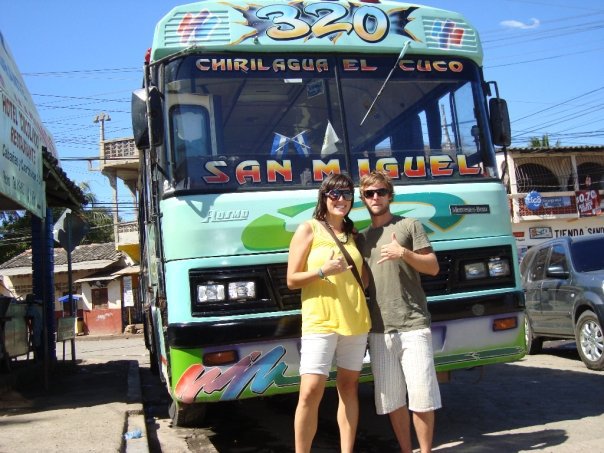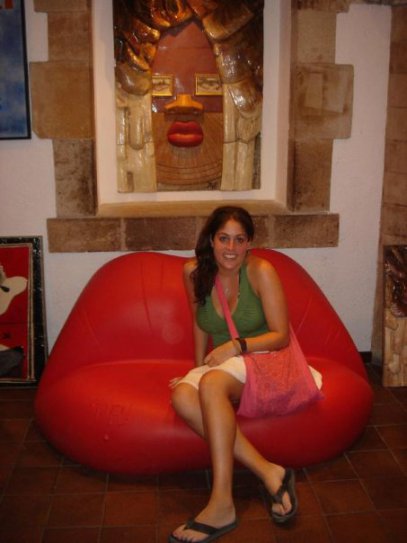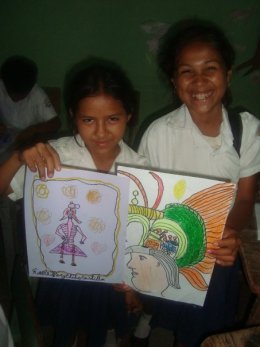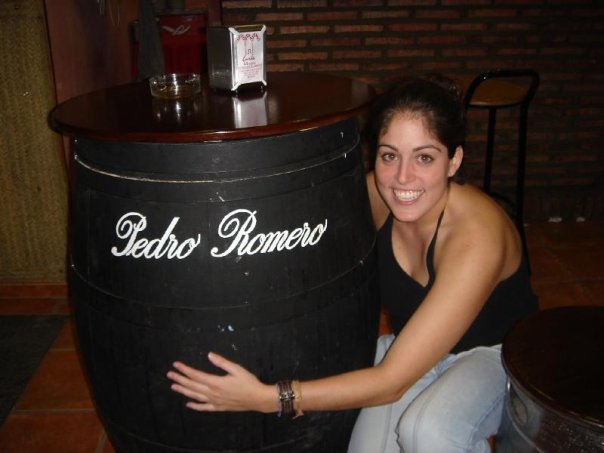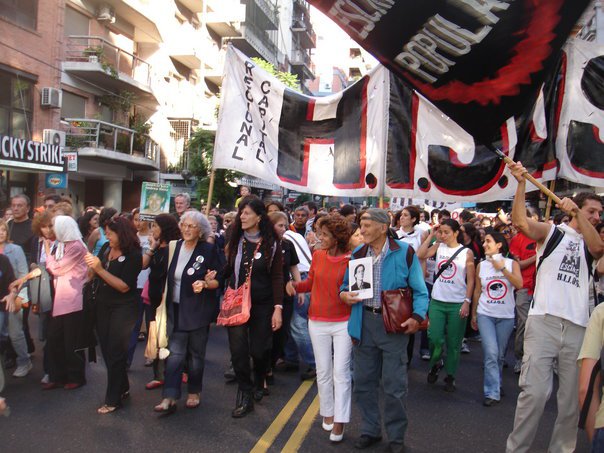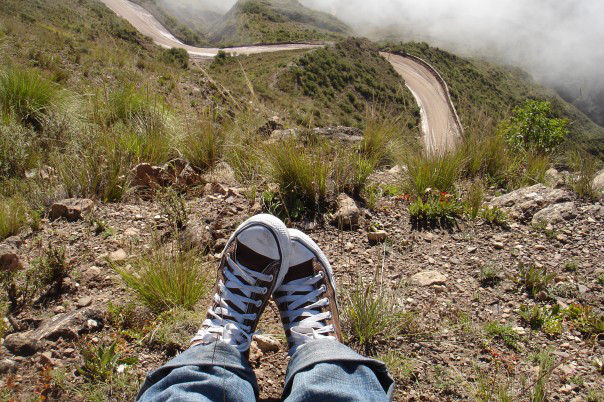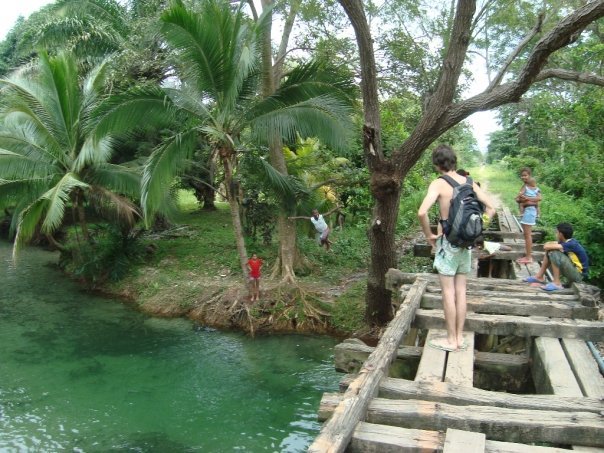Emilie was 15 years old when she first “studied abroad.” Although it was only a 10 day educational tour of France and Spain, the experience would jumpstart an incredible transformative life journey. Fifteen years later, Emilie has studied abroad five times, backpacked through the U.K., served in the Peace Corps and worked abroad in Central America. Emilie Romero is now ISEP’s Marketing and Creative Director. Here is what she learned along the way:
Rome Wasn’t Built in a Day, and You Can’t Become Fluent Overnight
As a sophomore in high school, I had never been out of the country by myself. I had taken French for four years, but always had a hard time speaking it. My sister, who studied abroad two years prior, told me that when she did her 10 day exchange – she came back “fluent.” Although I was a bit skeptical about someone learning a language that quickly, the idea of never having to study French again, intrigued me. In France, I did my best to represent my country well. I ran (yes ran!) to the nearest McDonalds to order “le Big Mac.” The excitement I had ordering in French for the first time was beyond exhilarating. I had been in the country for five hours and was sure I was almost fluent. Only after I felt a paralyzing fear run through my body, did I realize that there was no way I could order anything else in French. I spent only four days in France, and the best thing I learned was how hard it is to learn a language. My sister, who has some incredible linguistic gene, might be one of the only people on earth to have mastered French in 10 days. Learning a language is difficult, and to really become fluent, I realized I needed to immerse myself in a culture to truly speak like a local.
Immerse Yourself in the Culture and Learn Something New
I arrived in Barcelona, knowing absolutely nothing about Spain. I just heard there was a great beach. However, I never even saw the playa, because I was ushered onto a bus to learn about Spanish art. Forty-five minutes later, I found myself walking into someone’s home. Little did I know, it was not just anyone’s home, it was the casa de Salvador Dali. One of the greatest surrealist painters of all time. I literally could not stop taking pictures. I was obsessed. I even laid down on the floor to take a picture of the painted ceiling. I left feeling transformed. The next day, we took a trip to see a cathedral. On the way over, I was a bit agitated because I wanted to go shopping. However, when I got out of the bus, I looked up to see one of the most amazing architectural masterpieces ever built. I was standing in front of the La Sagrada Familia, a cathedral built by Antoni Gaudi–one of Spain’s most famous architects. His work literally, “blew my mind.” (Enter a gif of an exploding head). He was so creative and unique, and as someone who loves out-of-the-box art, I was enchanted.
What I learned was that I was glad I did not go shopping or to the beach. My experience in Spain made me an art lover for life. I went home from that trip and enrolled in three art classes for the next year. Ten years later, I would teach art history and surrealism to elementary students in rural Honduras, while serving in the Peace Corps.
I taught 60 kids not only about Spanish painters like Dali and Picasso, but about José Guadalupe Posada, the Mayans, Australian Aboriginal art and more. I knew my students couldn’t travel, but I wanted them to learn about the world and experience art like I did: awakened and entranced.
Don’t Let Your Fear Stop You From Learning A Language
After my junior year of high school, I went on a bit of a heritage quest. I backpacked through Ireland, England and Wales to get to know more about my mother’s side of the family. However by the time I got to college I still felt a little guilty that I could not speak Spanish. My father’s heritage is Puerto Rican, by way of Spain, yet no one in my immediate family spoke Spanish. One might find this a bit odd, but apparently it is very common in America. Due to racism against Puerto Ricans in the 1950’s, when my father was born, my grandfather decided to stop speaking Spanish in order to give his children a better chance at “assimilating” and passing as “white.” His Puerto Rican family in return, disowned him. Therefore, I grew up never knowing most of my Puerto Rican relatives. The only semblance I had of being Puerto Rican was my last name, Romero. Even then, I would frequently have to explain where my last name came from, as if I was a “white” quarter-rican impostor. People would say, “well you don’t look Puerto Rican, I think you must be Italian.” Anyways, this happened so frequently to me in college, that I finally felt like I owed it to my grandfather to learn Spanish and take ownership of my heritage. At the time, there were no programs offered in Puerto Rico, so I decided to study abroad for a summer in Seville, Spain. However, when I got there, I felt like I might have made a horrible decision. It was 120 degrees outside, and the Spanish “lisp” was stronger than ever. I started having anxiety about speaking Spanish. I didn’t think I could do it. Panicking, I walked into a restaurant to get some water. I just happened to glance over to a table and that is when I saw my last name (see picture below).
Maybe it was a sign from my grandfather, or maybe it was just a table, but whatever it was, I took about 100 pictures. I also felt at that moment like I was in Spain for a reason. I started asking people about my last name and soon found out that the family Romero, was very famous. Apparently the Romero’s invented the bullfighter’s muleta, a red cape used in conjunction with the sword during bullfights. What I learned from this study abroad experience was that I finally felt proud to be a Romero. From that moment on, I told myself that I would no longer fear speaking Spanish, but instead learn it with pride.
Live With a Host Family and Don’t Look Back
While in Seville, I chose to live with a host family. The first day I met the family, they sat me down around a table and proceeded to eat lunch in their underwear. It might have been one of the most bizarre moments of my life. I kept telling myself, well, this might just be what Spanish people do, so don’t look at them weird and just thank them for the meal. I wish that had been the only isolated case of weirdness. After our meal, they showed me to my room, where I saw that I would be sleeping in a oversized drawer. I wish I had a picture, because it was amazing. It had knobs and everything, and was elevated on four crates. For some reason, I just kept telling myself, just roll with it Emilie, this is a cultural experience. The next day, my host mom gave me my first school lunch, a delicious sandwich made up of two slices of white bread and two hotdogs in the middle. Needless to say, these odd occurrences continued. The family started disappearing, I never saw them…and then they started leaving my lunches out for me in the sun. Finally one day they just stopped leaving me food…
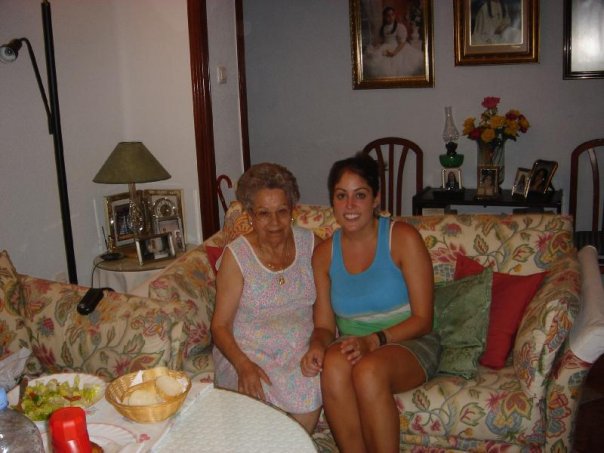
After three weeks, I decided I had to switch families. I felt bad, but it just wasn’t what I wanted. I was really scared about facing my host mom and telling her I was leaving. Yet, when I did it, I felt empowered. I stood up for myself and found a solution to my own problem. I interviewed a couple of nice ladies and then finally fell in love with one host mom (above). She found out I lost weight and was determined to feed me three-course Spanish meals every day. I was so happy because I could finally experience the Spanish “siesta,” which in my opinion was part nap, part food coma. Anyways, my host mother treated me like I was her daughter, and helped me with my Spanish. She never judged me and really showed me what it was like to live in a Spanish household. I am eternally grateful for my experience with her. In the end, I do not regret living with the first family. Not only is the story now hilarious, but I learned a lot about myself in the process. I realized how flexible I could be and how to solve problems. Ultimately, the experience made me stronger and more independent. I went on to live with four more host families, and highly recommend it. It is the best way to truly improve your language skills and learn more about a culture.
Intern and Volunteer Abroad For Your Resume and Your Own Education
I started off in college as a Physical Therapy major. However as soon as I returned home from Spain, I marched into my advisor’s office and switched my discipline. I decided I wanted to study international politics and learn more about the world. My experience in Spain changed me and I wanted more. I chose to go to Argentina, and this time for six months. I wanted to learn more about Latin America and human rights issues. I got the opportunity to intern with the Abuelas de Plaza de Mayo, an organization with the goal of finding the children stolen and illegally adopted during the Argentine Dirty War.
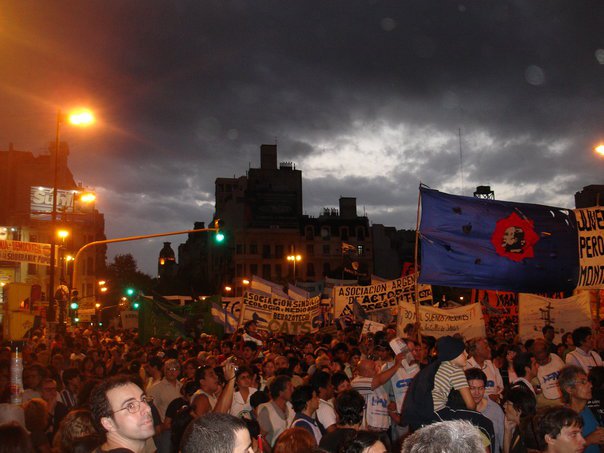
My experience working for them and learning about Argentina’s history made me realize how little I knew about other countries. I realized that even with a good U.S. education, there was so much that I was not being taught. By studying abroad, I learned that it is the only way you will truly understand a country’s history and struggles. I was fortunate enough to be present during the 30 year, city-wide march to “Never Forget” the estimated 30,000 government issued civilian disappearances (pictures above). I also got the chance to volunteer on the outskirts of Buenos Aires in a shanty town called the villas miserias. What was interesting was that no one talked about this shanty town, as it was seen as an embarrassment to many middle-class Argentinians. My experience working in that shanty town exposed me to extreme poverty for the first time. As someone who grew up in a middle-class household, I became acutely aware at that moment of my own “white privilege.” After that experience, I became very interested in social justice and started deconstructing my own identity, in order to better understand other’s struggles on a more complex level. My study abroad experience in Argentina helped me grow into a more mature and open-minded human being. I went on to use examples of these experiences in interviews, which helped me land successful internships and jobs with The Peace Corps, UNICEF, Human Rights Watch and the National Economic and Social Rights Initiative (NESRI).
Each Time You Study Abroad, You Will Realize You Should Have Stayed Longer
After graduating college, I applied for the Peace Corps and committed to volunteering for two years and three months in Honduras. The Peace Corps was the most immersive and culturally challenging experience of my life. It was also the most rewarding. From my previous study abroad experiences, I knew that two years would not be that long. Even after I completed my Peace Corps service, I had wished I had stayed longer. I say this because I would never have been able to form long-lasting, authentic friendships, become fluent in a language, or even truly learn about myself – if I had stayed for a shorter period of time.
Whether you are thinking about doing a 10 day education tour or a year-long program, know that the more time you spend abroad, the bigger your return. My advice, do a semester or a year-long program, bite the bullet, and don’t look back. You can do it! It will change your life (for the better!).
Like this Story? Also like us on Facebook.
